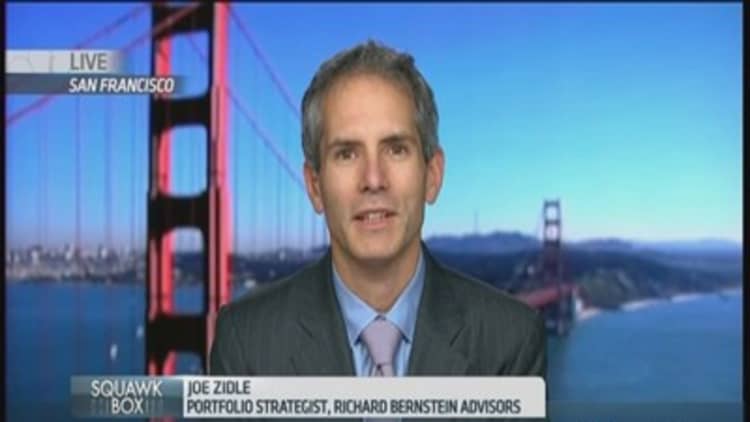The world's third-largest economy will hold a general election this Sunday as Prime Minister Shinzo Abe seeks a fresh vote of confidence amid a sputtering economy. Here are a few important factors to keep in mind before the big day.
There's a lack of opposition
Confusion is high among voters on the need for an early election since there's little opposition to Abe's policies. Last month, the country's largest opposition party, the Democratic Party of Japan (DPJ), agreed with Abe's decision to delay a second consumption tax increase, calling it "unavoidable," after Japan tipped into recession on the back of April's tax increase to 8 percent from 5 percent.
Read MoreWhat recession? Japan Inc is on a roll
Opinion polls show the DPJ doesn't pose a threat to Abe's ruling Liberal Democratic Party (LDP) and neither do the two other major opposition parties: the Japan Innovation Party and the Japan Communist Party. The DPJ is seen winning 70 of the 475 seats in parliament's lower house, while the other two parties are set for equally minor gains. On the other hand, the LDP and the Komeito party are expected to secure over 300 seats combined. The coalition held 326 seats when the lower house was dissolved last month.
"Although support for Abe and his Liberal Democratic Party has declined, support below 10 percent for the largest opposition party means that the LDP is still likely to maintain its majority of seats," said Alison Evans, senior analyst at IHS Country Risk.
The timing is strategic
Experts widely agree that expectations of a landslide victory on Sunday will consolidate Abe's position within the LDP ahead of the party's presidential elections in September 2015.
"The timing of this election means that Abe will renew his mandate before a likely further decline in 2015 and before the fractured opposition is able to build support closer to the level of the ruling coalition," Evans said.
Read MoreJapan needs foreign workers, but will they come?
The election is also a way for the prime minister to vindicate himself as his popularity falls on the back of April's sales tax hike, one analyst said.
"General elections have an ablutionary effect on miscreants—it's called misogi," said Jun Okumura, visiting scholar at the Meiji Institute for Global Affairs. The term means to purify oneself with water at a river and is commonly used in Japanese politics to describe candidates redeeming themselves in the public eye.

Reforms will be delayed
"The election is likely to delay any substantial progress on key reform policies until mid-2015 towards the end of the ordinary session of the new Lower House," IHS' Evans said.
These policies include a 5 percentage-point cut in the corporate tax rate and changes in the labor market, such as increased visas for construction and healthcare workers, as well as expanding childcare to encourage women into the workforce.
Read MoreJapanbears bet on Abe victory, yen disaster
"Most importantly, Abe's promise to tackle the Japan Agriculture administrative body's powers over cooperatives and policy is unlikely to be implemented in the coming year. This delay will negatively affect the Trans-Pacific Partnership (TPP) negotiations, which include tariffs on foodstuffs," IHS stated.
Winners and losers (apart from Abe)
Yuko Obuchi, the country's former trade minister who quit over a political funding scandal, is running as an official candidate on the LDP ticket. Once widely tipped to become the country's first female prime minister, Obuchi may be re-cast into the limelight in the event of an LDP victory.
On the other hand, local media reports paint the election as a breaking point for Ichiro Ozawa, leader of the opposition People's Life Party and former LDP lawmaker, who began campaigning in his home neighborhood for the first time in 30 years. Meanwhile, 82-year old Shintaro Ishihara, chief advisor of the opposition Party for Future Generations, announced he will retire form political life if unsuccessful on Sunday.
What it means for markets
With Japan's benchmark Nikkei stock index and dollar-yen sliding off recent seven-year highs, the elections are a binary risk for traders, noted Vishnu Varathan, senior economist at Mizuho Bank.
"If the LDP does achieve victory, it will be a chance to buy back the Nikkei and dollar-yen. In the event they fail, you may see some Nikkei slippage since it will spell weakness for Abenomics," he said.
Read MoreJapan machinery orders tank but don't sweat it
"Some of the big market moves have already come through, so there is a mitigated risk of overreaction. Positioning-wise, it's not too skewed for one side, so the election won't be cause for a correction."
Japanese stocks are 6 percent higher year-to-date while the yen has dropped 12 percent against the greenback in the same period.

